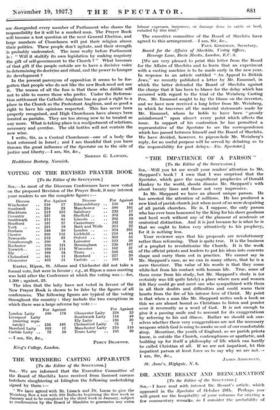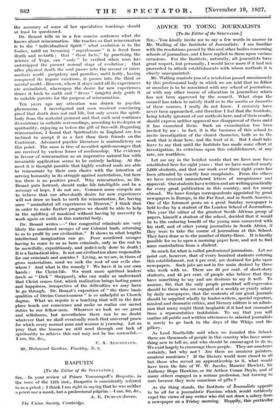DR. ANNIE BESANT AND REINCARNATION
[To the Editor of the SPECTATOR.] have read with interest Dr. Besant's article, which appeared in the Spectator of October '29th. Perhaps you- will grant me the hospitality of your columns for of i'cring a few commentary remarks, as I consider the probability of
the accuracy of some of her speculative teachings should at least be questioned.
Dr. Besant tells us in a few concise sentences what she knows about reincarnation. She teaches us that reincarnation is to the " individualized Spirit " what evolution is to the bodies, until on becoming " superhuman " it is freed from death and re-birth ; that " these facts," by practising the science of Yoga, can " only " be verified when man has outstripped the present normal stage of evolution ; that after physical death the soul passes into the second or inter- mediate world—purgatory and paradise, until lastly, having conquered its impure emotions, it passes into the third or mental world—Heaven, where it stays until all its experiences are assimilated, whereupon the desire for new experiences draws it back to earth and " devas " (angels) duly guide it to suitable parents for the purpose of reincarnation.
Ten years ago my attention was drawn to psychic phenomena. I investigated and soon received convincing proof that death does not end life, but only severs the spirit- body from the material garment and that each soul continues its existence in suitable surroundings, according to its degree of spirituality, enjoying as before the gift of free-will. Regarding reincarnation, I found that Spiritualists in England are less inclined to accept it as a fact than their friends on the Continent. Advanced psychic literature is contradictory on this point. The same is true of so-called spirit-messages that arc received by various forms of mediumship. The evidence in favour of reincarnation as an imperative natural law with invariable application seems to be entirely lacking. At the most it is thought possible that highly evolved souls are able to reincarnate by their own choice with the intention of serving humanity in its struggle against materialism, but here too there is no positive proof. Why reincarnation, as Dr. Besant puts forward, should make life intelligible and be a message of hope, I do not see. Common sense compels me to believe that our after-death desire for new experiences will not draw us back to earth for reincarnation, for, having once " assimilated all experiences in Heaven," I think that in order to make further progress we should be able to help in the uplifting of mankind without having by necessity to work again on earth in this material body.
Dr. Besant writes :—" Our congenital criminals are very likely the murdered savages of our Colonial bush, returning to us to profit by our civilization." It shows to what lengths intellectual imagination can go. Poor murdered savages having to come to us as born criminals, only in the end to be mercifully, expeditiously, and judiciously done to death ! It is a fantastical idea. Is not our civilization alone responsible for our criminals and suicides ? Living, as we are, in times of
gross materialism, need we seek the root of our evils else- where ? And what is the remedy ? We have it in our own hands : the Christ-life. We want more spiritual leaders (such as " Dick " Sheppard), who can make us understand that Christ comes first, which realization brings lasting peace and happiness, irrespective of the difficulties we may have to go through. Dr. Besant's exposition of " the three basic qualities of Divine Consciousness " is as unhelpful as Church dogma. What we require is a teaching that will in the first place touch our conscience and make us realize our sacred duties to our fellow-men, Wherever we-look we see greed and selfishness, but nevertheless there can be no doubt whatever that we- shall eventually reach that universal peace for which every normal man and woman is yearning. Let us pray that the lessons we still need through our lack of spirituality to achieve this end may not be too sorrowful.— I am, Sir, &c.,
C. A. AESCIIINIANN.
80, Holmwood Gardens, Finchley, N. 3.















































 Previous page
Previous page